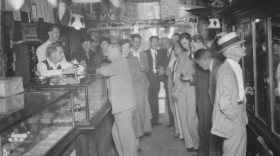The University of Michigan hockey team started its season last week. But the program started 94 years ago. It was a surprising byproduct of the worst man-made explosion to that point, and of a young man who changed his mind about Americans.
Joseph Barss is one of the most important people in the history of Michigan athletics. But you wouldn’t have guessed that from his family background.
His great-grandfather, Joseph Barss Jr., was the most notorious privateer in Canadian history. During the War of 1812, he captured, sank, or burned more than 60 American ships, making him America’s most wanted man.
Three generations later, Joseph Ernest Barss grew up in Wolfville, Nova Scotia. At his hometown Acadia University, he starred in football, hockey, baseball, and boxing. After graduating cum laude in 1912 at age 19, Barss moved to Montreal, where he rose to become a district manager for Imperial Oil. He seemed to have it all: a great career, money, and fun, but no sense of purpose.
That changed when Barss decided to become a machine gunner in World War I.
Barss was itching to fight. He wrote his parents, “As you have probably noted, I am full of this thing.” But after a year of combat, he said, “I think we are all heartily sick of the whole show.”
His rehabilitation was interrupted by the biggest man-made explosion the world had ever seen.
A few weeks later, a German shell sent Barss flying, knocking him out, paralyzing his left foot, and giving him hand tremors. He spent six months in a body cast, then returned to his parents’ home to re-learn how to walk.
His rehabilitation was interrupted by the biggest man-made explosion the world had ever seen.
On Thursday, December 6, 1917, a French munitions ship called Mont-Blanc bumped into a Norwegian ship at 8:46 a.m. That wasn’t uncommon during the Great War, but Mont-Blanc’s cargo was: 6 million pounds of explosives, or 13-times the weight of the Statue of Liberty.
The collision knocked over barrels of airplane fuel on Mont-Blanc’s deck, spreading fire across the bow. Mont-Blanc’s crew ran to their lifeboats, while workers and schoolchildren on shore watched the ghost ship slip perfectly into Pier 6.
In less time than it takes to blink, 25,000 people were homeless, 9,000 were wounded, and 2,000 were dead.
Eighteen minutes later, Mont-Blanc blew up, wiping out half of Halifax. In less time than it takes to blink, 25,000 people were homeless, 9,000 were wounded, and 2,000 were dead. It was the world’s largest manmade explosion before the atomic bomb, and one-fifth as powerful.
When Barss went to help he couldn’t believe his eyes. “I saw some terrible scenes of desolation and ruin at the front,” he said, “but never did I ever see anything so absolutely complete. In that entire area of over three-square miles there was not one stick or stone standing on another. Every house and building had just crumpled up and the whole was a raging mass of flames.”
Barss put his first-aid experience to use for three sleepless days before being relieved by medics from Boston. Barss was impressed, writing that “The [Americans’] response was so spontaneous and everything done even before it was asked for. It brought tears to all our eyes. You know we have always been a trifle contemptuous of the U.S. But never again! They can have anything I’ve got. And I don’t think I feel any differently from anyone down here either.”
Barss returned home with a new sense of purpose.
He decided to go to the University of Michigan’s medical school, marry a woman from Battle Creek, become an American citizen, and start the University of Michigan’s hockey program, which has won a record nine national titles.
It all started with a wounded veteran of the Great War, a young man who decided to put his life back together by helping others do the same.
John U. Bacon’s latest book, The Great Halifax Explosion: A World War I Story of Treachery, Tragedy, and Extraordinary Heroism, debuts Tuesday, November 7, when he will appear at 7 p.m., at Michigan’s Rackham Auditorium, with Michigan Radio’s Cynthia Canty. His views are his own and do not necessarily reflect those of Michigan Radio, its management, or its license holder, the University of Michigan.







